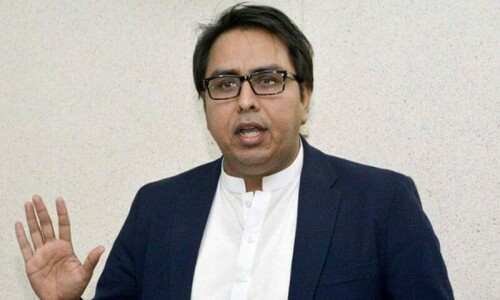There are times when decisive military action is the only way to break the deadlock. In this case, the Syrian civil war had been dragging on for five years of relentless bloodletting without any resolution in sight. Desultory diplomacy was going nowhere as the rebels insisted on Assad’s ouster as a pre-condition for talks. In this, they were backed by their supporters in Saudi Arabia, Turkey and many Western capitals.
Unsurprisingly, there were no takers for this position in Damascus, Tehran or Moscow. For Iran, the exit of an Alawite ally would have meant a huge strategic setback. And for Russia, the victory of violent Sunni groups like the militant Islamic State group, Al-Nusra and Ahrar al-Sham would have meant the loss of their naval base at Tartus. Such an outcome would also have posed a grave danger to the non-Sunni citizens of the country like the Druze, the Alawites and the Christians. After the way minorities have been treated in Iraq, Egypt and Syria, ethnic cleansing on a vast scale awaited them at the hands of Bashar al-Assad’s probable successors in Damascus, had the Islamist rebellion succeeded.
So despite the odious nature of the Assad regime, he is the least nasty leader in sight. One thing the Western media and leaders have consistently and deliberately ignored is the support Assad continues to enjoy among a significant section of the population. Had it been otherwise, he would have been ousted long ago. The minorities have backed him and fought for him out of sheer self-preservation. Having seen what happened to the Yazidis in Iraq when they were captured by brutal IS fighters, they know they are fighting for the lives, their homes and their wives and daughters. This is an element in Assad’s support that, thus far, has gone unrecognised.
The recent meeting in Moscow among representatives of the Russian, Iranian and Turkish governments to coordinate action in Syria following the end of the siege of Aleppo is significant in that Americans and Saudis were absent from the discussions. This highlights the situation on the battlefield where those doing the fighting are Shia militias, Hezbollah fighters, units of the Syrian army and Russian air force pilots.
The turning point in the war seems to have come with Turkey joining the battle against Islamic groups after years of covert support for them. Soon after the civil war began in 2011, Erdogan, the Turkish president, advised Assad to negotiate with the opponents to his rule. The Syrian dictator cracked down on them instead, imprisoning and torturing thousands. The ensuing turmoil was exploited by jihadi groups to enter the fray. Erdogan, snubbed by Assad, allowed Turkish soil to be used as a springboard for extremist fighters flocking to join various Islamist groups. The Turkish border was open to money, arms and volunteers from Europe. Saudi, MI6 and CIA agents all congregated to Turkey to supply and train Syrian rebels as well as foreign fighters.
Once Turkey was attacked by the IS in a series of suicide bombings that claimed hundreds of victims, Erdogan reversed his policy and became an active partner in the anti-IS coalition. This, in addition to Russia’s decisive intervention, turned the tide, and the IS is hard-pressed to maintain the fiction that it is indeed a state.
But it is in the end of the siege of Aleppo that we can discern the light at the end of the tunnel. This victory finally gives the Assad regime a means to roll over the rebels in the west of the country. Rebel-held Idlib and the villages on the edge of Damascus would seem to be the next targets of the regime’s operations. With the post-Aleppo momentum behind them, and facing a defeated and demoralised foe that has been debilitated by fierce infighting, the Russian-Syrian-Iranian alliance should be able to clear the area.
This would mean the effective bifurcation of the country with the Assad regime controlling the prosperous coastal belt, while Islamist groups occupy parts of the desert. Currently, the Syrian army is down to around 25,000 fighting troops, and much too enfeebled to launch a major operation in the desert. So a standoff is likely to last, perhaps for years. But this is a far better outlook for Assad than any he had expected when the rebels threatened to occupy all of Aleppo.
One reason for so much misreporting about Aleppo is that major media networks no longer wanted to risk sending reporters to cover the siege. Far too many foreign journalists have been kidnapped and either held as hostages for ransom, or publicly executed. So journalists have been covering the fighting from Lebanon or Turkey. The rebels have been adept at exploiting this vacuum by posting desperate appeals highlighting their suffering on the social media. What was not explained was why they did not allow their families to be evacuated out of the battle zone.
According to some reports, women and children were being used as human shields by jihadist rebels. This is credible as this ruthless ploy has been used by IS in Mosul, Raqqa and elsewhere. And we must not forget that both the Syrian regime and the Russians have not pulled their punches when bombing rebel-held areas of Aleppo. Many hospitals have been destroyed, giving rebels more material for their propaganda offensive.
One thing recent events have taught Arab leaders is that the Americans cannot be relied upon, while Russian friendship is a far better bet. How American policy will be shaped in the Trump presidency remains to be seen, but he has said he will not send American troops to fight distant wars.
For the moment, given American failure and Russian success, the balance of power has changed in the Middle East. Leaders in the region will be pondering over the altered scenario for some time to come.
Published in Dawn, December 26th, 2016














































